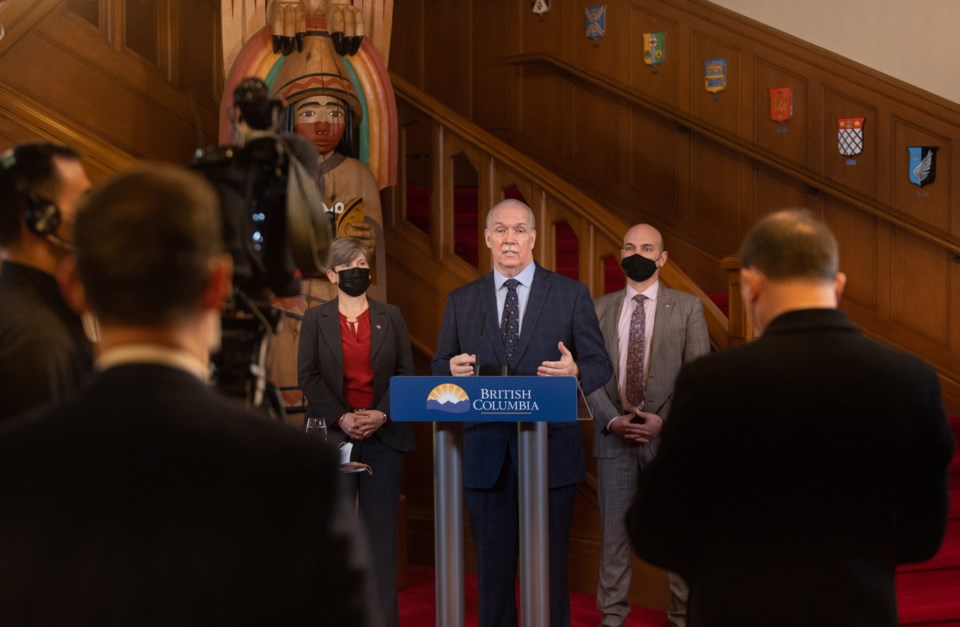Nathan Cullen was always going to be a front-bench superstar cabinet minister in the government of Premier John Horgan. It just took him a while to get there, as he travelled on a journey of political redemption.
Cullen was a big get for Horgan when he announced in September 2020 he was considering a run in provincial politics after 15 years as the MP for Skeena-Bulkley Valley. A former multiple time parliamentarian of the year, his time with the federal New Democrat caucus gave him a reputation as a smart, quick-footed and ambitious politician. As soon as he announced his interest in BC politics, the rumour mill earmarked him as a possible future successor to Horgan as leader of the provincial party.
But then, it all went sideways.
There was much debate within the party about where Cullen should run provincially and, conversely, where he wanted to run. He could have gone anywhere, but ended up staying in Stikine.
This was a problem.
The riding had just been vacated by Doug Donaldson, and the BC NDP’s “gender equity rules” stipulated that whenever a male incumbent retired, the nomination should be filled with a candidate from an underrepresented community, be in female, Indigenous, LGBTQTS+ or disability.
That didn’t work for Cullen, a cis-gendered straight middle-aged man.
So the party went about breaking the rules for him.
That kickstarted a remarkably messy several weeks, in which Annita McPhee, the former president of the Tahltan Nation, was bigfooted out of the way so that Cullen could take the nomination.
McPhee, however, did not go silently. She took to the media to point out the many ways the party both blacklisted her from consideration to leave Cullen the only candidate, and then at the last minute declared her nomination to have “invalid signatures” – a problem she fixed within the hour but never heard back from the party…until seeing on social media that Cullen had been named the default candidate.
"If they were truly exercising their equity mandate and wanting to attract diverse, strong candidates, you would work with people, such as myself, an Indigenous woman, to help sort that paperwork out, to allow time, or to at least explain what's going on," McPhee said at the time. "I just believe that I wasn't given a fair shot at the nomination."
Cullen claimed he’d done nothing wrong, that it was a party issue. The party, which moved heaven and earth by breaking its own rules to shoehorn him into the riding, was unhappy at the situation Cullen had forced. So was Horgan, who faced several days of questions on the campaign trail about the BC NDP’s treatment of female aboriginal candidates, and why a good-old-boys club of middle-aged white men felt entitled to give themselves local nominations.
That was mark one against Cullen.
Mark two came a few weeks later when Cullen was overheard disparaging local First Nations leader Roy Jones Jr., who was running as the BC Liberal candidate.
"He's not well-liked - he's Haida - in his own community," Cullen said, while being caught on an open mic. "The guy's going to get bedrock 20 per cent. Like, his name is Kinkles.”
Jones Jr. pointed out the nickname was given to him as a boy by a Japanese grocer who was friends with his parents and means “golden boy.”
"Even on my fire jacket - on the sleeve, it's got Kinkles,” he said publicly. “I've got a lot of pride in where my names came from. If somebody wants to be a bum about it, that's what they do, I guess. When you're a public figure you just don't do these things.”
Cullen had to apologize – again. Horgan, meanwhile, was now fielding a second round of media questions about his star candidate.
"I expressed my disappointment with his comments - as I said, what you say privately you should be able to say publicly," Horgan said.
"I know no one's going to work harder than Nathan Cullen to make up for his stupid comments," he added.
In a way, Horgan was right.
After the BC NDP won the 2020 election, Cullen was skipped over as a full cabinet minister – an almost unthinkable outcome in 2020 when he’d announced his entry into provincial politics.
Instead, Cullen was given the junior position of Minister of State for Lands and Natural Resource Operations.
But Cullen did not complain publicly. He just went about his work quietly behind the scenes on a long-term project of helping figure out how the government could split the then Ministry of Forests, Lands and Natural Resource Operations into two separate, hopefully better-functioning, ministries.
He spent two years in that role, helping pitch in where needed on forestry issues, connecting the BC NDP apparatus with his contacts from almost two decades in the province’s north and, yes, its First Nations communities as well.
By all accounts, he did a good job. Recognizing politics is a team sport, he kept his head down, did what was asked of him and contributed where he could.
On Friday, Horgan named Cullen the Minister of Municipal Affairs. (Not, oddly, in the new lands ministry role he’d been preparing for.)
“His skill set coming to this new position as minister responsible for Municipal Affairs is absolutely critical to how we move forward with respect to climate change and of course coming out of the pandemic,” said the premier.
For Cullen, the appointment is vindication. It’s the culmination of a two-year journey back into the good graces of the premier, and where he was seemingly always destined to be – on the front bench of the BC NDP cabinet as a major player.
Rob Shaw has spent more than 13 years covering BC politics, now reporting for CHEK News and writing for The Orca. He is the co-author of the national best-selling book A Matter of Confidence, and a regular guest on CBC Radio.



